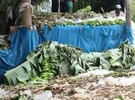Banana importer AgroFair is fair trade certified. But the certification has no rules about what the company should do with the large amount of plastic waste it produces. AgroFair is aiming for sustainable production. The company is using a subsidy from the Fund for Responsible Business to set up local recycling plants.
Luud Clercxs, project manager at AgroFair: “Our goal is a project that is economically sustainable.”
Tackling the plastic problem Large numbers of plastic bags can be found along the edges of banana plantations in Peru and the Dominican Republic. Growers use these bags to protect the bunches from birds and insects while the bananas ripen. Once farmers harvest the bananas, the plastic bags are thrown away, buried or burnt. Suppliers rarely recycle this plastic. AgroFair aims to change that. The company has been encouraging its banana suppliers to collect the plastic for a long time. Now, AgroFair is thinking bigger. Their current goal is to recycle all the plastic waste from every banana plantation in Peru.
Large numbers of plastic bags can be found along the edges of banana plantations in Peru and the Dominican Republic. Growers use these bags to protect the bunches from birds and insects while the bananas ripen. Once farmers harvest the bananas, the plastic bags are thrown away, buried or burnt. Suppliers rarely recycle this plastic. AgroFair aims to change that. The company has been encouraging its banana suppliers to collect the plastic for a long time. Now, AgroFair is thinking bigger. Their current goal is to recycle all the plastic waste from every banana plantation in Peru.
From plastic bags to corner brackets
The Peruvian banana industry uses more than 20 million plastic bags each year. AgroFair wants to recycle this plastic waste to make corner brackets. Corner brackets are a packaging product used in the maritime transport industry. These brackets are fitted onto the corners of a pallet and prevent the banana crates from toppling over during shipping. By making the brackets themselves, AgroFair can both reduce costs and boost local employment. The goal is to produce enough of these corner brackets to reinforce 200,000 pallets of bananas each year.
8 recycling plants
AgroFair works closely with partners, including the Netherlands Enterprise Agency. The company submitted its proposal to the Fund for Responsible Business (FVO) in 2019. The proposal described their plan for 6 recycling plants in Peru and 2 in the Dominican Republic. The Netherlands Enterprise Agency helped improve the proposal and granted AgroFair €250,000 in subsidy funding. The Luxembourg-based supermarket chain CACTUS contributed another €50,000.
Self-sufficient
Luud Clercxs, project manager at AgroFair: “For us, and for the Netherlands Enterprise Agency, it is important that the project does not end when the subsidy period stops. Our goal is a project that is economically sustainable.” Clercxs thinks this is definitely possible: “Our original calculations show that to break even in Peru, we need to produce 45,000 corner brackets each year. In 3 years’ time, when the 6 recycling plants are in operation, we will be able to make a total of nearly one million corner brackets per year.”
Focus on recycling
A good example inspires others to follow it. This results in more projects for improving waste collection and separating plastic waste. That plastic can then be turned into corner brackets in local production facilities. The mango, grape, and avocado industries in the region have problems with plastic litter as well. Clercxs: “Once you have opened 1 recycling plant, others can follow your example. From there, it becomes easy to expand."
For more information:
Frank Vermeersch
AgroFair
Tel. +31(0)180 643 975
Mobile: +31(0)654 774 190
Email: [email protected]
www.agrofair.nl










